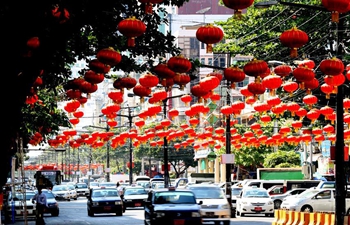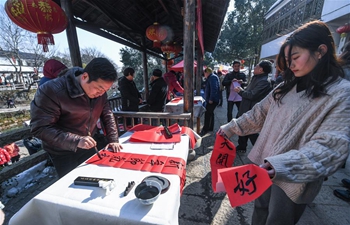XINING, Feb. 5 (Xinhua) -- The 3,100-km journey home from his high school did not stress 17-year-old Sonam Wenjam, who comes from a Tibetan prefecture in northwest China's Qinghai Province.
On Feb. 1, he arrived at Qinghai's provincial capital, Xining, after a 48-hour train journey from Shenyang, capital of northeast China's Liaoning Province. He has been studying at Shenyang Xiangyu Middle school for three years.
From Xining, Sonam Wenjam and other students boarded buses and took another 10 hours to arrive home in Yushu Tibetan Autonomous Prefecture, about 800 kilometers from Xining.
"I miss my mother the most. I still remember when my parents saw me off at the bus station three years ago. I felt so heavy in my heart because the school is far from home, and away from my parents," he said.
"I don't feel so heavy-hearted now and I'm more sure of myself. It is a necessary experience for growing up," he said on the bus.
A total of 156 students took bus trips on Thursday, said Kumjo Doje, deputy director of traffic police in Yushu City, capital of Yushu prefecture.
Sonam Wenjam and the students are part of a competitive but promising national program that takes children from remote and impoverished areas in provinces such as Qinghai, Tibet Autonomous Region and Xinjiang Uygur Autonomous Region, and allows them to attend senior high schools in central, east and southern China.
Every year, thousands of students are enrolled in the programs. The programs are funded by the government. When schools are out of session for summer and winter holidays, educational authorities, schools and police arrange the students' travel back home.
This year, 2,195 students from Yushu studying in other provinces are expected to travel home for the new year. Officer Kumjo Doje said the figure is about half of the total number of students in the Yushu program.
"Not all students choose to make the journey during the Spring Festival travel rush, when the transport system is under a lot of pressure," he said.
The police department in Yushu shepherded the students' buses to ensure their safety.
"The bus drivers are experienced and know about the road conditions -- a third of the roads from Xining to Yushu are frozen earth. The police car is in the front leading the way to keep the bus from speeding," said Kumjo Doje.
"We have carried out the task for eight years, and this year, there are 15 groups of students to escort," he said. Teachers also accompany the students back home.
Sonam Wenjam has received state funding during his study in Shenyang, but his parents also send him a monthly allowance of 1,000 yuan (about 158 U.S. dollars).
"My father herds cattle in the Chongda Township in Yushu City. I used to dig for caterpillar fungus to help support the family when I was in primary school, but after I went to middle school, my father said I had to focus on my studies so that I can go to better schools in more developed places," he said.
In Shenyang Xiangyu Middle School, Sonam Wenjam gets up at 5:30 a.m. every morning and stays up until 11 p.m. studying. He has 13 classes in Tibetan language and culture every week.
"Our Tibetan-language teacher is also from Yushu. He wears traditional Yushu Kangba robes in class, which reminds me of home," he said.
"Studying in the city is an eye-opener. The books are more up-to-date," he said.
"But the bad thing about the city is that it has smog," he said. "And there are mosquitoes -- we hardly see them in our hometown," said Soam Palde, a student from Golog Tibetan Autonomous Prefecture.
Sonam Wenjam bought down coats and sweaters for his family. "In a few days, there will be the Tibetan new year," he said.
He keeps a fountain pen given by the Yushu prefectural governor, who visited the Shenyang school in December last year.
"My dad is a herdsman, but he writes Tibetan words beautifully. I'm giving this pen to him as a new year's gift," the 17-year-old said.
After the new year holiday, the students will embark on another journey from home to school.
"I'm very lucky. Compared with many students back home, I have better education and more opportunities to learn. In the future, I hope I can make my hometown a better place through my own strength," he said.
















